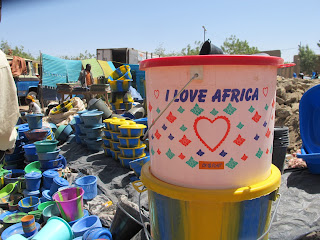The Indian Artist
It is quite strange actually: You hear that people are afraid of a federal
Europe. For example, they might fear that the EU will set things like pension
levels or mortgage interest rates or the price of water. That is why they do
not want more European integration. And despite my preference for an integrated
Europe, they might be right. In exchange for financial support, Portugal is
being forced to sell its water company. The EU does indeed protect
multinationals more than people. But without European agreements, all the
decisions are made by financial interests, housed everywhere in this world. So,
that system does not work.
But maybe I should be careful here. Performing on stage, I have learned
that everything that is put into the spotlight becomes irrelevant sooner or
later -- or at least less important. It will be put in the history books on
modern times, published by millions on their profiles, and forgotten in no
time. So, I have learned to keep the most important things backstage. Meanwhile,
people keep accelerating toward more new things. At the moment, changes occur
so fast that things like engine oil or pencils get newly designed packaging
once a year. Every city redesigns its squares, and streets and crossroads are
turned into traffic roundabouts because of some existing available funds. Old
monuments are covered with a mighty glass entrance or graced with
remarkable architecture. Slowly, we are becoming a
society of inventing what already exists -- of creating what is already there. That
is exactly the problem I have with design, which is the most popular thing in
our city’s branding strategy. If the heart changes due to wisdom, love, or
knowledge, you still look the same, still have the same face and wear similar
cloth. It also works the other way around: if you decorate a tree, it is still
a tree.
Let’s add an Indian perception: Imagine you are starting to paint or write
poetry, and you keep that up for a while. You discover and explore the art of
painting or poetry. However, in India they say: when you are a painter, you are
not an artist, you are a painter; when you are an actor or a poet, you are not
an artist but an actor or a poet. There are eight skills in the arts. If you
explore, discover, develop, and present at least four of these skills, you may
call yourself an artist. The impact of these words is severe. Several years ago,
we had 16 million artists in our country, and they all wanted to have their
Andy Warhol minutes of fame. In the last few years, probably for opportunistic
political reasons, we have dropped to only 8 million artists. But after reading
this Indian wisdom, there might be only a few left and things may become
clearer.
Most people do want to live together. It is just a lack of knowledge, a
reasonable lack of trust in our leaders, and a true lack of leaders for the
people that make not us cherish and use this wisdom.
To me it is quite strange actually.
I’m sure this column will make me focus on other things in upcoming columns.
To me it is quite strange actually.
I’m sure this column will make me focus on other things in upcoming columns.



